Szlachta UJ sądach miast króleiuskich u; spraiuach karnych in XVI-XVIII inieku
Nobility in royal city courts in penal cases from 16th to 18th century
Author(s): Marian MikołajczykSubject(s): Law, Constitution, Jurisprudence, Criminology, 16th Century, 18th Century
Published by: Wydawnictwo Naukowe Uniwersytetu Mikołaja Kopernika
Keywords: municipal law; criminal procedure; nobility;
Summary/Abstract: Poland in the early modern period retained class law. This means that there were separate courts for the nobility, bourgeoisie, and peasantry. That said, these courts did not work in complete separation. City courts in penal cases tried not only the bourgeoisie, but also other people, irrespective of where the offence had been committed. As it turns out, among the accused and brought to trial there were also members of the nobility, although the then-applicable laws, as a rule, excluded such a possibility. Such cases were rare, how¬ever — especially in the larger royal cities — they did occur on a regular basis, until the end of the 18th century.In some of these cases, there were legal foundations that allowed for the trying of no¬blemen by city authorities. When a noble offender committing certain serious offences was captured on city premises, he would be tried jointly by a county court and city court. Sometimes, a county court would entrust a city court to detain a noble offender. It was often the case, however, that noble offenders were tried by city courts with complete disregard of the applicable courts. What is more, these courts would sentence such offend¬ers, only occasionally taking into consideration objections as to their lack of jurisdiction. We can suspect that a significant role in this was played by the actual social status of the accused. Noblemen tried before city courts were usually declassed, with little connection with the state from which they descended. The type and magnitude of the charges were arguably very important as well. The need to take decisive action against criminal activity might have put aside noble privileges and regulations as to the applicable jurisdiction. Some role might have also been played by local customs, earlier precedents, and — last but not least — a city’s high rank, which enabled it to try a nobleman without fear as to the consequences of doing so.
Journal: Klio. Czasopismo poświęcone dziejom Polski i powszechnym
- Issue Year: 42/2017
- Issue No: 3
- Page Range: 203-222
- Page Count: 20
- Language: Polish

